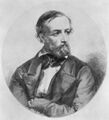Template:Selected anniversaries/May 5: Difference between revisions
No edit summary |
No edit summary |
||
| (40 intermediate revisions by the same user not shown) | |||
| Line 1: | Line 1: | ||
<gallery> | <gallery> | ||
File:Ioannes Faulhaberus Mathematicus Imperialis Ulmæ Natus.png|link=Johann Faulhaber (nonfiction)|1580: Mathematician [[Johann Faulhaber (nonfiction)|Johann Faulhaber]] born. He will discover Faulhaber's formula, which expresses the sum of the ''p''-th powers of the first ''n'' positive integers. | |||
File:Peter Gustav Lejeune Dirichlet.jpg|link=Peter Gustav Lejeune Dirichlet (nonfiction)|1859: Mathematician [[Peter Gustav Lejeune Dirichlet (nonfiction)|Peter Gustav Lejeune Dirichlet]] dies. He made important contributions to number theory, analysis, and mechanics. Dirichlet was one of the first mathematicians to give the modern formal definition of a function. | File:Peter Gustav Lejeune Dirichlet.jpg|link=Peter Gustav Lejeune Dirichlet (nonfiction)|1859: Mathematician [[Peter Gustav Lejeune Dirichlet (nonfiction)|Peter Gustav Lejeune Dirichlet]] dies. He made important contributions to number theory, analysis, and mechanics. Dirichlet was one of the first mathematicians to give the modern formal definition of a function. | ||
File:Charles Grafton Page.jpg|link=Charles Grafton Page (nonfiction)|1868: Inventor, physician, chemist [[Charles Grafton Page (nonfiction)|Charles Grafton Page]] dies. His work had a lasting impact on telegraphy and in the practice and politics of patenting scientific innovation, challenging the rising scientific elitism that maintained 'the scientific do not patent'. | File:Charles Grafton Page.jpg|link=Charles Grafton Page (nonfiction)|1868: Inventor, physician, chemist [[Charles Grafton Page (nonfiction)|Charles Grafton Page]] dies. His work had a lasting impact on telegraphy and in the practice and politics of patenting scientific innovation, challenging the rising scientific elitism that maintained 'the scientific do not patent'. | ||
File: | |||
File:Lazarus Immanuel Fuchs.jpg|link=Lazarus Fuchs (nonfiction)|1833: Mathematician and academic [[Lazarus Fuchs (nonfiction)|Lazarus Immanuel Fuchs]] born. He will contribute important research in the field of linear differential equations. Fuchs will be the eponym of Fuchsian groups and functions, and the Picard–Fuchs equation. | |||
File:Karl Jansky.jpg|link=Karl Guthe Jansky (nonfiction)|1933: The New York Times The New York Times publishes a front-page account of a scientific paper on radio astronomy by [[Karl Guthe Jansky (nonfiction)|Karl Guthe Jansky]]. | File:Karl Jansky.jpg|link=Karl Guthe Jansky (nonfiction)|1933: The New York Times The New York Times publishes a front-page account of a scientific paper on radio astronomy by [[Karl Guthe Jansky (nonfiction)|Karl Guthe Jansky]]. | ||
</gallery> | </gallery> | ||
{{Template:Categories: May 5}} | |||
Latest revision as of 20:34, 2 May 2024
1580: Mathematician Johann Faulhaber born. He will discover Faulhaber's formula, which expresses the sum of the p-th powers of the first n positive integers.
1859: Mathematician Peter Gustav Lejeune Dirichlet dies. He made important contributions to number theory, analysis, and mechanics. Dirichlet was one of the first mathematicians to give the modern formal definition of a function.
1868: Inventor, physician, chemist Charles Grafton Page dies. His work had a lasting impact on telegraphy and in the practice and politics of patenting scientific innovation, challenging the rising scientific elitism that maintained 'the scientific do not patent'.
1833: Mathematician and academic Lazarus Immanuel Fuchs born. He will contribute important research in the field of linear differential equations. Fuchs will be the eponym of Fuchsian groups and functions, and the Picard–Fuchs equation.
1933: The New York Times The New York Times publishes a front-page account of a scientific paper on radio astronomy by Karl Guthe Jansky.




